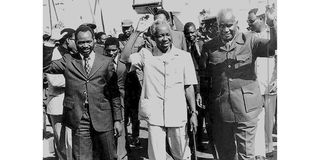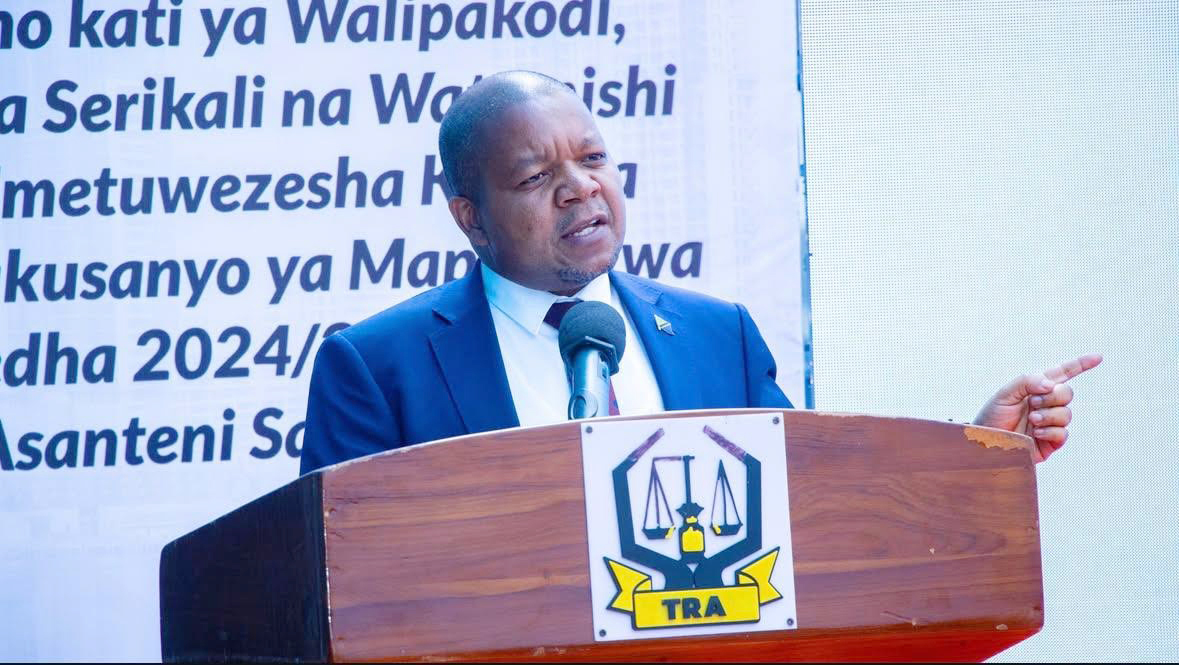Mwalimu Nyerere as a leading pan-African hero

Mwalimu Julius Nyerere of Tanzania (C), Samora Machel of Mozambique (L) and Kenneth Kaunda of Zambia wave to the crowd in a past joint event. The three leaders were among the first crop of leaders of Africa in post-colonial times. PHOTO | FILE
Today, October 14, 2021, we commemorate once again the passing on of Mwalimu Julius Kambarage Nyerere to the eschatological life. It is an inspiration in the struggle for Africa’s Unity and Economic Independence. The enterprise of the Catholic Church to canonize Mwalimu Nyerere is yet another proof of the greatness of Mwalimu Nyerere as a specially gifted pan-African leader.
Mwalimu Nyerere is indeed one of Africa’s leading pan-African heroes of the 21st Century. He was a passionate African statesman who believed that pan-African freedom as the only legitimate political action, by the African leaders and elites to emancipate Africa from economic bondage.
He was a leading force in the emancipation of the African continent from bondage and he spearheaded the formation of one country - the “United States of Africa.”
To him, pan-Africanism meant a united and self-determined African continent in pursuit of economic, political, social, ideological and cultural freedom. He portrayed this uncompromising pan-African stance when he said: “…African nationalism is meaningless, dangerous, and anachronistic, if it is not, at the same time, pan-Africanism...”
Mwalimu Nyerere writing about the essence of the formation of Organization of African Unity (OAU) he described that OAU was a springboard instrument to catapult Africa into unity, he asserted: “…Africa wishes to have the political strength to prevent other powers using her for their own ends, and it wishes to have the economic strength to justify and support a modern economy, which is the only basis on which prosperity can come to its people….For each one of us is so weak in isolation….Without unity, there is no future for Africa…”
Mwalimu Nyerere speaking at the Founding Conference of the Organization of the OAU on May 26, 1963 in Addis Ababa he spoke: “…The enemies of Africa are now praying. They are praying for the failure of this conference. The people of Africa are also praying. They are praying for the triumph of PAN-AFRICANISM OVER NARROW NATIONALISM AND REGIONALISM. They are specially praying for the triumph of an all-embracing Africa Charter over a Monrovia or Casablanca.
Mwalimu Nyerere continued to say: “…It is unnecessary for me to prophesy that is shall not be recorded in history that, “BUT FOR THE STUBBORNNESS AND NON-COOPERATION OF TANGANYIKA THE ADDIS ABABA CONFERENCE WOULD HAVE BEEN A SUCCESS”. Our National Motto is “UHURU NA UMOJA” (FREEDOM AND UNITY). Our National Anthem is “GOD BLESS AFRICA...”
Mwalimu Nyerere was a true pan-African who was opposed to the continued fragmentation of the African continent, and in one of his speeches in 1966 he expressed his discontentment that: “…Politically, we have inherited boundaries which are either unclear or such ethnologically and geographical nonsense that they are a fruitful source of disagreements….the present boundaries must lose their significance and become merely a demarcation of administrative areas within a large unit…”
On November 4, 1985 in his farewell speech to leave office as President of Tanzania; Mwalimu Nyerere thanked his people in their endurance and patience when he had to spend time, energy and country’s resources to try and secure for the freedom and unity of the African Continent. He said: “I thank you because your support for those struggling against colonialism and apartheid has been inspired by your feeling…We therefore understood from the beginning that cooperation cannot be confined within our own national boundaries, and total African liberation and unity is important for all Africa’s peoples…”
And when he retired and out and office, Mwalimu Nyerere was persistent in his belief to the pan-African miracle of Africa to liberate itself from economic bondage. In a speech at the 40th Independence Anniversary Celebrations of Ghana in Accra, on March 6, 1997 he urged the current African leaders to strive for unity by saying: “…A new generation of self-respecting Africans should spit in the face of anybody who suggests that our continent should remain divided and fossilised in the shame of colonialism, in order to satisfy the national pride of our former colonial masters. Africa must unite! …That call is more urgent today than ever before…”
After his death his legacy as a pan-African has lingered on in assertions and praises of Politicians, Academicians and Researchers as chronicled in this article. One historian, David Chacha of the University of Dar es Salaam, urges people of Africa to cherish Mwalimu Nyerere by writing: “…Africa needs to keep alive the dream and vision of Mwalimu Nyerere for a shared destiny of the African people. The full realization of our being lies in our collectivity as Africans. Our freedom, strength, dignity, survival and prosperity as a people depend on our unity as Africans, for only in unity can strength be found…”
Julius Malema, a political opposition leader in South Africa - giving an address at the Africa Day Cerebrations on May 25, 2018 - had this to say: “…Let us celebrate a pan-Africanist Julius Nyerere. Those are the people who welcomed the ANC and the PAC in exile in Tanzania and made it possible to be trained and come back to fight against the nonsensical murderous apartheid regime… It was people like Julius Nyerere who received us when it was difficult…You will never know the role Julius Nyerere played in the revolution because those who write our history they distort it to suite the white man…”
Again, President Yoweri Museveni of Uganda, a staunch follower of Mwalimu Nyerere, during a celebrations marking the Martyr’s Saints of Uganda Day on Sunday June 3, 2018 at Namugongo, in Uganda, at a prayer to further the canonization process of Nyerere described him as “…A devoted Christian and patriot who espoused pan-African values…a devoted catholic, patriot and a true pan-African and a great leader, why not call him a saint….who worked to unite us all…He brought us together always as African and that makes him special…”
As Mwalimu Nyerere with his colloquies led the struggles to achieve the visions of pan-Africanism and attain economic progress for Africa the African Continent; rich nations also continued to jerk Africa into a global trap - an economic conspiracy that would guide poor nations to dance the song of dependence lubricated by the drum sounds of money in form of grants (gifts), loans and foreign direct investments.
Today the United States of Africa has not yet been achieved but the dream remains alive and inspired by the song of unity titled Africa Unite of the pan-African singer – Bob Marley, who appeals to the leaders and peoples of Africa to unite and liberate Africa from economic bondage. The song goes: “…Africa unite: because we are moving right out of Babylon (neo-colonialism), and we are going to our Father’s land (the United States of Africa)… Yes, how good and how pleasant it would be before God and man… to see the unification of all Africans…”
Yes, Africa must unite or perish!
The author is a geologist, former commissioner for minerals and former Member of Parliament




